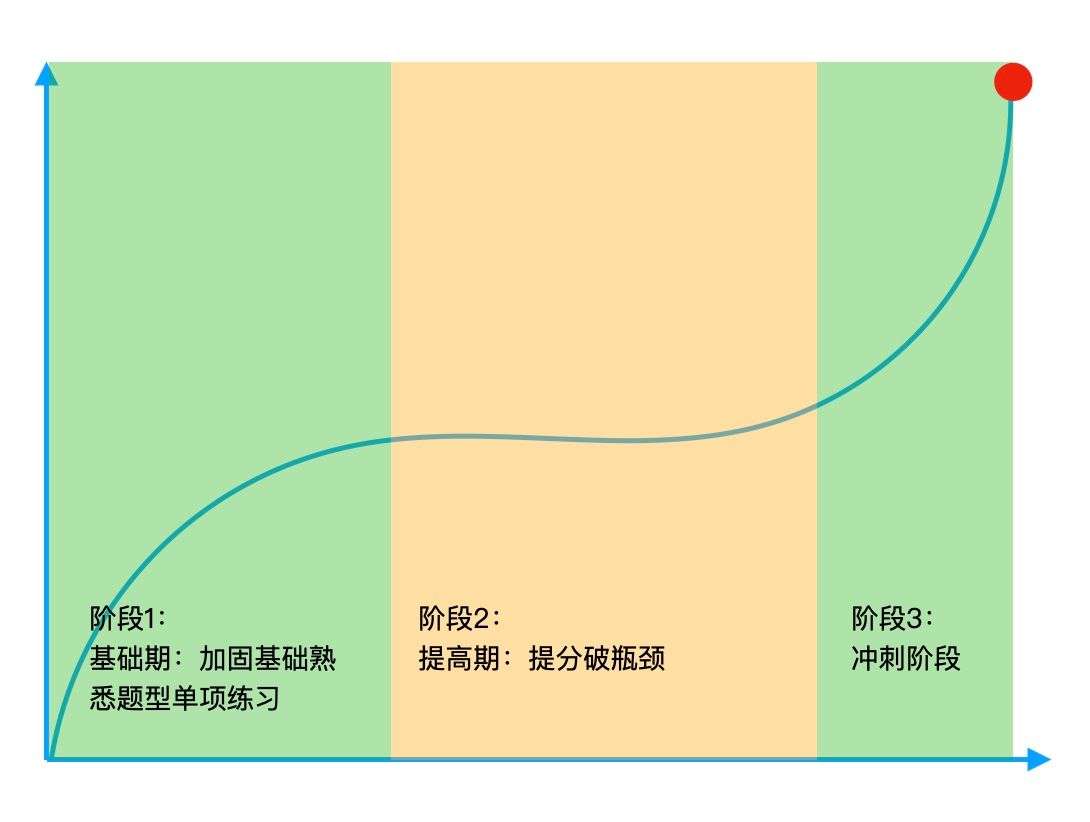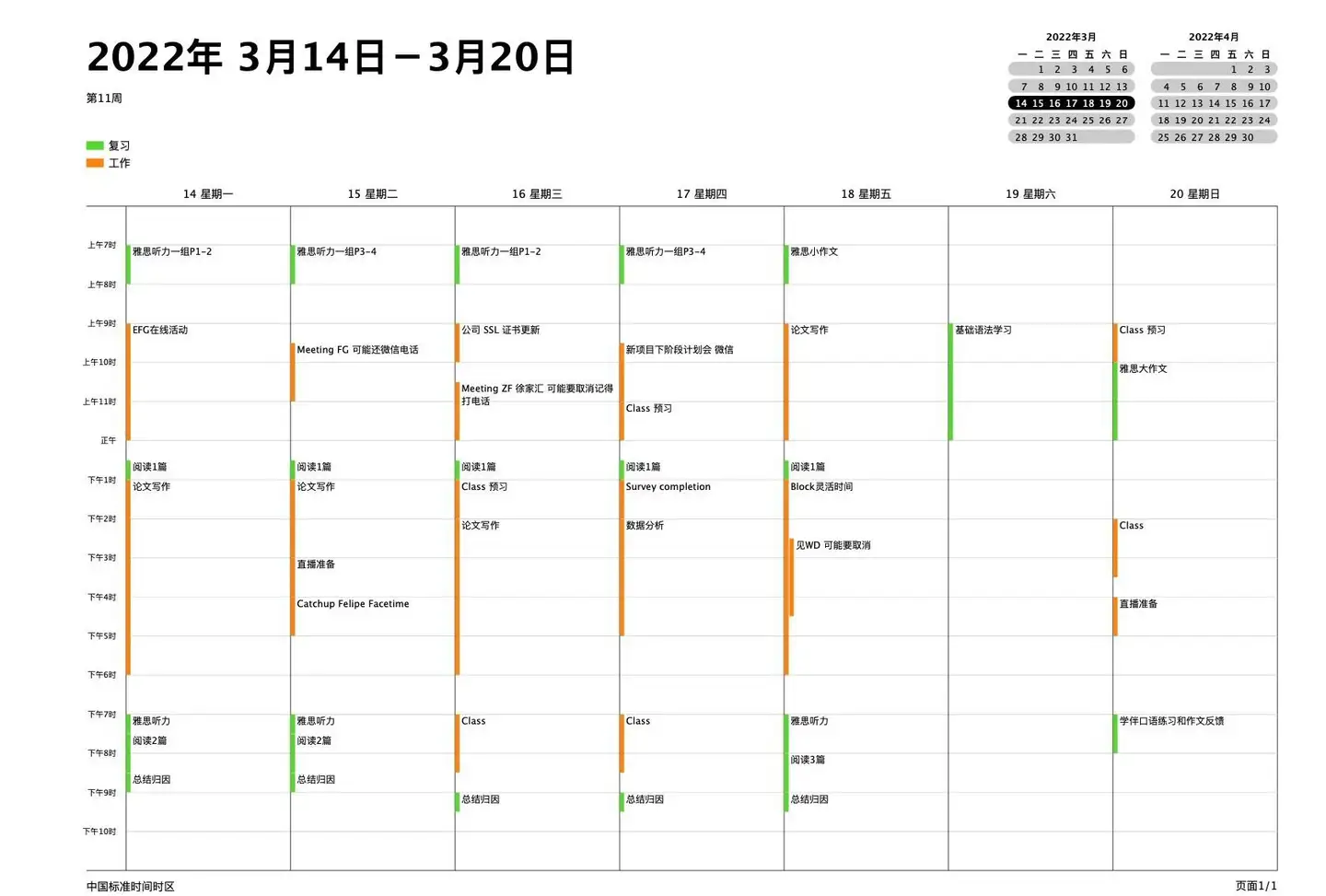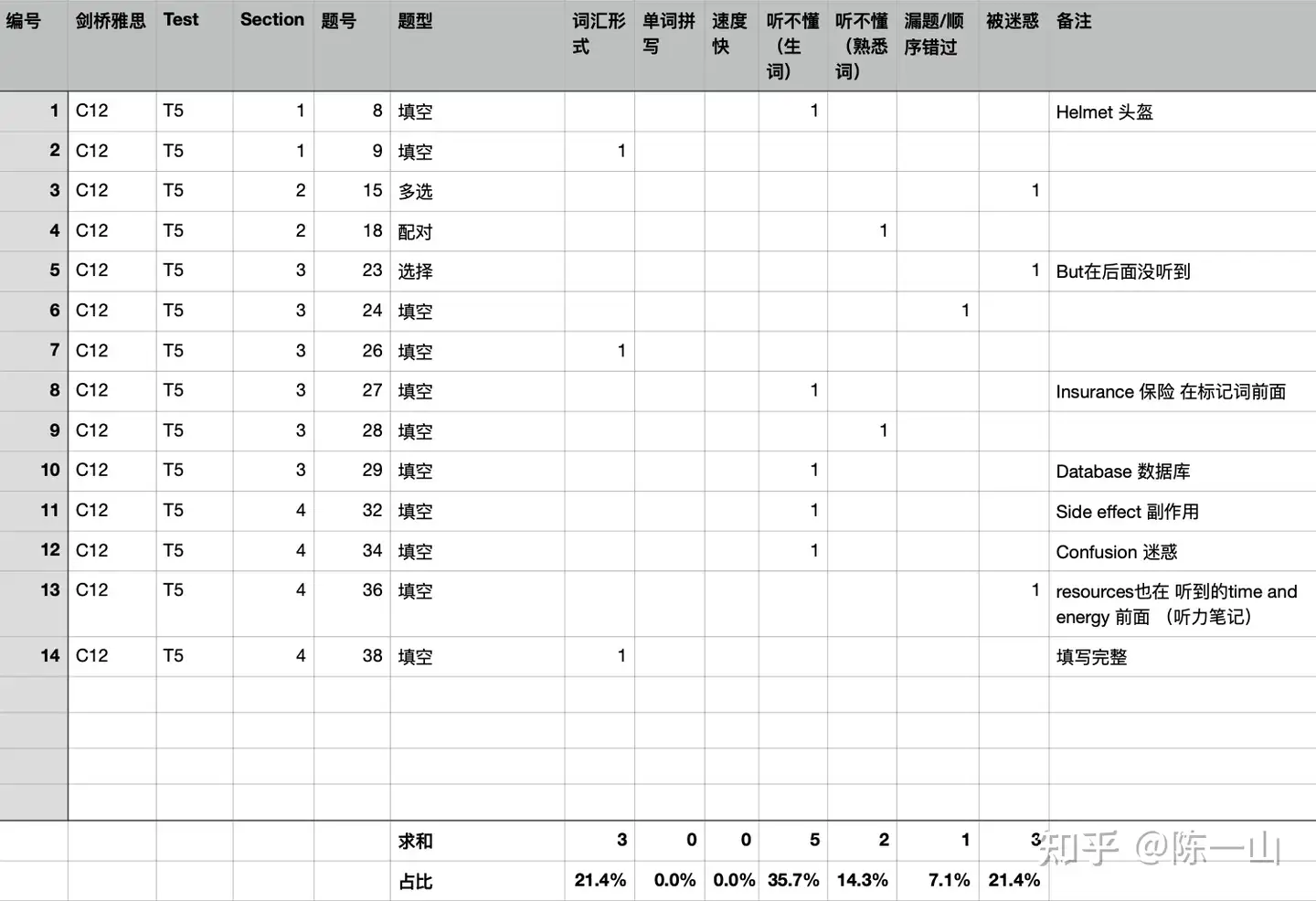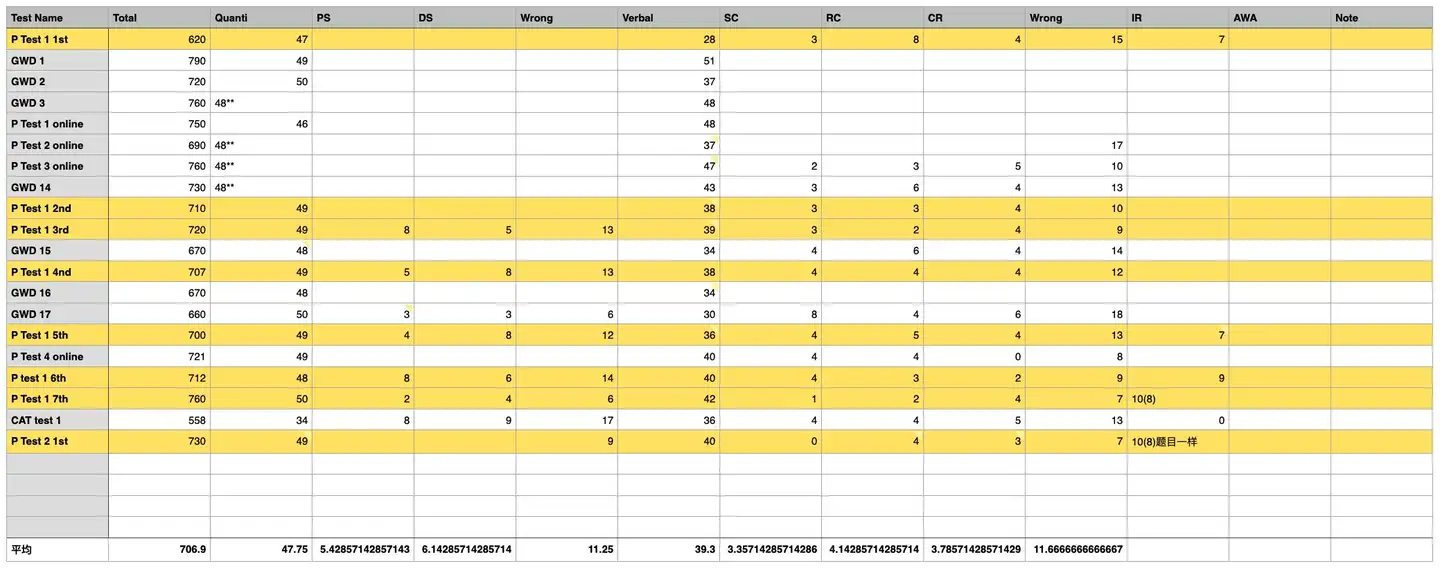If you miss this self-study preparation guide that has been proven many times, you may spend a lot of time but still fail to improve your test scores.
Like everyone else, I personally don't like exams, but exams are all the same. This test preparation method is my own summary, and it has helped me to pass many standardized tests while working. You can apply it to other exams such as CFA exams, college entrance exams, actuary exams, etc. Here I mainly use my own IELTS [8 points] and GMAT [740 one-time pass] exam preparation as examples.
Please like, follow, and share so that more people can see this experience. You are also welcome to watch the live broadcast room on Zhihu @陈一山 at 7pm every Monday, Tuesday, and Friday.
In general, the test preparation pointsBasics, Improvement, Sprintthree phases.
The main methodologies are:The learning-practice-statistical error checking cycle improves the process.It is necessary to do enough questions, but when doing the questions, you must figure out where you went wrong and correct them, otherwise it will be just a tactic of doing a large number of questions - useless.
Your feelings about your results should be similar to the following figure, with the horizontal axis being time and the vertical axis being learning effect.The difficulty is how to break through the bottleneck.

Without further ado, let’s look at the requirements for each stage.
Phase 0: Find existing strengths and weaknesses
【Usually 1-3 days】
How to plan for self-study of IELTS and GMAT | Introduction + Phase 0244 Play · 2 Likes video
1. Do a set of quizzes without reviewing
Check the difference between the total score and the target score, count the mistakes and reasons for the mistakes, and adjust your mindset - the purpose of this test is to correct your weaknesses. In addition, you can simply know the core elements and key points of this exam by doing a set of questions. Of course, you can also search for the core elements and key points summarized by other experts.
IELTS: No matter what exam it is, look for official mock questions. IELTS is Cambridge IELTS. The core of IELTS is communication ability (Category A is academic communication ability, and Category G is life and work communication ability). The scope is general academic communication terms and daily terms, so it does not require you to deliberately show off particularly complex grammar, such as the independent subject structure - it is rarely used in daily communication, even in school.
GMAT: GMAT is a simulation test of the Prep software provided by OG. The specific core is logic. In fact, it is a math, physics and language logic test using English as the medium. Therefore, language comprehension is only the basis. What you need to train is the set of logic that it emphasizes to you.
2. Make a plan and allocate time according to strengths and weaknesses. If you have less time to prepare for the exam, you can strategically give up and focus on
This plan requires a large-scale review stage, as well as a small daily hour arrangement to make reasonable use of fragmented time. Generally, these times can be:
- 7-8 am in the morning before school and work
- Lunch break at 12-13 o'clock
- After dinner at home, between 7 and 10 o'clock
- Take an extra 3-4 hours in the morning on weekends
You can't prepare for the exam all the time besides work and school, so generally speaking, the time for reviewing while working and studying can be about 20 hours per week. Generally speaking, it is more appropriate to prepare for a large standard exam in 3 months, and less in 1 month. If you can't review all day, the effect will be limited. The following is a simple example of my own review now.

There is also a strategic tendency in the allocation of time:Spend less time on strong items and more time on weak items; review the items that are easy to improve first and spend more time on them, and review the items that are not easy to improve later and just spend the minimum time on them.
IELTS:Listening is the easiest to improve, followed by reading, then speaking, and finally writing. So when time is tight, if there is a lot of room for improvement in reading and listening, you should take these two subjects as seed subjects and get relatively high scores; speaking and writing are more difficult to improve, and the requirements are also high, so you can do more than the minimum review. If you have enough time, review the simple ones with more room for improvement first, and then review the difficult ones with less room for improvement.
GMAT: The easiest parts to improve are all the math parts (the content of domestic high schools is simple but the angles are tricky), sentence correction in language, followed by reading, and finally language logic. If time is tight, review language logic as a minimum, quickly get math to 80-90%, which is almost the target, and then do sentence correction and reading in the language part. If time is sufficient, quickly get math first, and then spend more time focusing on reviewing the language subjects, which are really difficult.
The results of this phase are:
- Complete a set of test questions
- Know the core and scope of the exam
- Know your gap
- Know your strengths and weaknesses
- Have a targeted exam review strategy
- Have a specific hour-by-hour preparation plan
Phase 1: Foundational Phase
Strengthen the basics and familiarize yourself with the question types and practice single items [usually 40% in total time]
1. Arrange time to strengthen the foundation
Generally speaking, during this stage, you should arrange at least 25% of time a week to study, which can usually be put on Friday night or weekend, because these days usually have plenty of free time, which is more suitable for study.
IELTS: academic vocabulary list, listening vocabulary list, basic grammar, word formation, basic test-taking ideas. If a week is about 20 hours, you can spend 2 hours on 2 days during the week + 1 hour on the weekend to study; the study materials can be basic tutorials [everyone is welcome to watch my live broadcasts and videos of practicing questions], or books [I have bought some books for IELTS, but I didn’t use them much (raise your hand if you have memorized a vocabulary book. As soon as you give up, how can you memorize it?). If you really want a recommendation, you can read "Merriam-Webster's Vocabulary Builder", which talks about vocabulary and word formation, and has exercises, but the most important thing is the problem-solving methods and ideas], there are also some vocabulary lists summarized by everyone, you can send me a private message if you need them.
GMAT: basic grammar (stricter than IELTS), math academic vocabulary, etc. The time arrangement is similar to IELTS; the study materials can be various great problem-solving videos and live broadcasts, such as Ro God, or books, such as Manhattan Grammar.
2. Use your spare time to watch less Douyin and do more exercises in groups
First improve the accuracy to the 80% you need to meet the requirements
IELTS: Free time can be 7-8 am before school or work, 12 pm for lunch, and 7-10 pm after work. Choose relatively early questions, such as Cambridge 10-13, and do reading, listening, writing and speaking separately. Each subject can be done separately, such as a reading passage (10-20 minutes) and a listening passage (7-10 minutes). If you want to get 7 points, you can't make more than 3 mistakes in the reading passage and no more than 2 mistakes in the listening passage.
GMAT: You can follow the official review questions of sentence correction and logic, which are grouped into 10 questions. It takes about 15 minutes to complete a group. If you have one hour, you should try to complete 4 groups, and get 80% correct.
3. Leave time to check for mistakes after finishing the test
It is about half of the time for doing the questions, but you can adjust it according to the number of questions you got wrong, and then add corresponding special exercises during the study time. You don’t need to count the mistakes at this stage, you just need to know your approximate weaknesses.
IELTS: This can usually be arranged in the evening, so that you can do the questions in your spare time during the day, and go home at night to summarize and figure out the mistakes you made in each question you missed. Why did you make mistakes? Was it because of unfamiliar words? Then memorize the words quickly; still can't understand the grammar? Then review the grammar quickly; still can't hear it? Then practice the intensive listening note-taking method
GMAT: Also leave it to the evening of the same day. Most people who take the GMAT are busy with work, and sometimes feel that they are not able to do it, but they still need to check for errors. After all, the GMAT is a big factor in business scholarships. When I was helping the business school recruit students, the teacher said that it mainly depends on the GMAT and undergraduate scores. Since the undergraduate scores cannot be changed, the GMAT scores are the only controllable factors. Therefore, for scholarships and various special projects, you need to check for errors, find out why you exclude other options, why you choose an option, how did you go wrong, did you not understand the main idea? Then practice long-sentence scanning to read the main idea; is the grammar requirement stricter than usual? Then review the grammar book, you can use Manhattan grammar; is the logic not easy? Then find the pattern to classify the logical chain.
The results of this phase are:
- Find the review materials you need
- Strengthen the foundation
- After completing the selected group review questions, the results basically reached the target of about 80%
- Check for errors and continue to adjust your review strategy
- Make it a habit to follow your exam preparation plan
To help everyone avoid detours, Yishan also offers one-on-one IELTS courses.
Phase 2: Improvement
Improve your score and break the bottleneck [usually total time 40%]
1. Based on your feelings during the previous review phase, you should focus on rectifying the parts where you made many mistakes, and aim to achieve or exceed your goals in most cases.
At this stage, don't do general single-item exercises. Only do the questions that you are weak in and find difficult. This step is very important, especially for students who want to get high scores.
At this point, you have actually been reviewing for a while, and it is easy to get stuck. Remember what we said before that you need to know the core of the exam, right? Now why not take a step back and look at what the core of the exam is, such as going back to check the exam scoring criteria, or see what characteristics others have summarized for the exam to select?
You need to adjust your mindset at this stage. The bottleneck period is the stage when it is easiest to give up. Ask your family and friends to cheer you up. You can also come to my live broadcast to cheer with other fans.
IELTS: For example, if your goal is a total score of 7, then the reading and listening scores should be 7.5, so at this time, you should really practice the questions you make the most mistakes on. Generally speaking, at this stage, the difficulties are all difficult questions, such as P2 and P3 multiple-choice questions in listening, matching questions, the main idea of the paragraphs in the second and third passages of reading, multiple-choice questions, etc. Speaking and writing are those topics that you are not familiar with in Chinese. You need to find materials and have your study partner who is better than you to correct and simulate, and then give feedback, so that you know what to change [You can participate in our live broadcast to communicate and submit your essays to help you get feedback]. Sometimes you need to change something that you disdain, such as grammar that you think is rubbish. A simple example is that when I just started working, there was a period of time when my essays were stuck at 6 points, and I was not satisfied with it. Otherwise, I wrote emails to people in the company all day, and my level was about the same as that of a high school student, so I asked a friend to help me look at my writing, and the advice I got was that there were too many small mistakes. After that, I developed the habit of writing review, which significantly reduced small mistakes and made written communication smoother.
GMAT: Generally speaking, you should focus on the difficult questions with scores of 700+ at this time. You can find the difficult questions summarized in various forums (Chasedream) to practice. These questions are really difficult, but they are the same in essence. Don’t just look at the thousands of grammar questions shared by others. You have to do them yourself to gain something. Those who tell you that learning can be like buying stocks and waiting for time to rise are all scammers. I remember that I finished reviewing while working in the first month, and found that I couldn’t handle the sentence modification question. Later, I checked and found that the sentence modification question was actually a logic question disguised as a grammar question. Can you believe it? So the entire GMAT exam is about logic, and "Routine Deep" is written in the comment area...
2. Statistics, sorting, and attribution of wrong questions
At this stage, you must do statistics. It is important to say it three times. This will help you to see which subdivided knowledge points are easy to make mistakes more accurately than before, so that you can summarize the skills to deal with these difficult problems. The following is an example of my IELTS listening review wrong question statistics. You can use Excel or Numbers to make a table and put some automatic statistics functions to facilitate viewing your own statistics. It mainly includes:Title, error, reason, classificationthese messages.

IELTS and GMAT: The methods of statistics, organization, and attribution are the same. Use Excel or Apple's Numbers to make a table, paste the questions in, write your answers at the end, and then write the reasons why you got it wrong. What is the correct answer? Then, what is the reason for the error? For example: at the execution level - carelessness, wrong writing, wrong copying, at the knowledge level - which grammar is wrong, which word you didn't hear yourself read, most of the time it is wrong, and the math knowledge points are particularly biased and specialized.
3. Slowly start reviewing the whole set of questions
The main thing is to start consciously coordinating your time while ensuring it is correct, and try to be as close to your exam environment as possible. It doesn't matter if the time doesn't match up at the beginning, but you have to start adjusting.
IELTS: Listening mainly involves pre-reading and note-taking. A good method requires you to scan and finish P2 before the nonsense is finished. Reading involves adjusting the time for several articles of different difficulty levels. Generally, the first article takes 12-15 minutes to complete, and the next two articles depend on the difficulty level. The difficult ones take 20 minutes, and you can have a few minutes of flexible time. You must use a real answer sheet to write your essay so that you can see where you have written and the number of words is about the same. For computer-based exams, find a mechanical keyboard to type on. Don't poke at a laptop keyboard or iPad screen. The feel is different and will affect your performance in the exam.
GMAT: To control the time of GMAT, you can fix a question number, and then see how much time you can reasonably answer, for example, 10 questions, about 15 minutes after the start. Then, you need to adjust the answer time for each question, and learn to guess the difficult questions with information to ensure the time, because each question is given 1.5 minutes at most. If you can't figure it out, guess a question with information and a high probability, and do it quickly. I have a deep understanding of this. When I was taking the exam, I encountered a question with a weird answer like 13/48. Don't ask me how I know the correct answer...
4. Track your performance and wrong question trends for the entire set of questions
This way I can track my review status and find the general direction for myself in time, such as time management, comprehensive psychology, and test skills. Then I can cheer myself up and feel happy when I see gradual progress. The following is the trend statistics of the set of questions I used when preparing for the GMAT. It basically predicts that the final exam will be more in line with my goals.

If the trend seems wrong, you need to see if there is any remedy or postpone the exam schedule.
IELTS and GMAT: Still use Excel, record the total score of each test. Of course, if you only did a single part, record it as well. You can make up the other parts according to the average score of the other parts before, which can also save time. When practicing IELTS, I practiced speaking less because I usually speak more and have scored high before. In addition, when reviewing essays, the language structure and content can be used universally. In order to save time, I will focus more on ensuring controllable listening and reading, and practice more weak writing. I did the same with GMAT math. Because it is simple, I didn't give it too much time, so the table generally records 48** to indicate the estimated score, and practiced more on the language part.
The results of this phase are:
- Find resources for special improvement, such as difficult question banks, study partners, teachers, etc.
- Your specialty is improved
- There are multiple special statistical error tables for improvement
- I did a few sets of questions and the results were at least okay, but there is still a gap.
- There is a set of test score trend statistics table
Phase 3: Sprint
【Usually total time 20%】
1. Practice the set of questions systematically until 3 days before the exam.
Generally, you will do one set of questions every 2-4 days, check for errors, and collect statistical trends. This is similar to the previous stage. The purpose of this stage is to maintain stability and reduce the possibility of problems on the test day.
IELTS: There is not much to say, the Cambridge IELTS that never changes, or various online simulation websites. This stage must be as close to your test conditions as possible. If you are taking a paper test, type it out. If you are taking a computer test, use a simulation website and computer. Otherwise, you will be unaccustomed to writing and typing, which will affect your speed. [Don't ask me how I know this, I learned the hard way from my GMAT essay]
GMAT: GMAT Prep software, GMAT Prep test sets on various simulation websites, GWD test sets, etc. All use the computer + draft paper method, and all essay exercises are done on the computer. It is best to find a mechanical keyboard, because the touch of a laptop keyboard is different from that of a mechanical keyboard, and the writing feel will affect the typing speed.
2. Read the useful part of [Recent] candidates recall the machine materials
The past exam questions are all recalled by others, so there are not many details, which means that they can only help you understand the main idea. You just need to be able to recall the main idea and know the solution by reading a few sentences of the original text. For some particularly difficult questions, it is estimated that you will remember the answers by the time you finish them. For more specific questions that you can do, skip the questions you know how to do, and use the questions you don’t know how to do by yourself to understand them.
IELTS: I seldom use them myself, but the writing and oral recall questions are quite useful. Skip the ones you know and have practiced, and write and talk about the ones you don’t know, and ask your study partner or teacher for feedback. For topics you don’t know, quickly check other people’s opinions [I’d like to add that the materials for oral and writing can be prepared together, and can be directly used from IELTS reading and listening]. For reading and listening, it is enough to know the basic idea, because the subjective questions in IELTS are not difficult, and at least half of them are objective questions. It is difficult to catch these machine-tested questions and their use is relatively small.
GMAT: Math, you can directly do the recall set. If you don't change the question bank, you may encounter exactly the same questions. The reading part of the language section is the most useful, because GMAT reading is basically the main idea and structure questions, so knowing the main idea and structure of the article is very important. The only time I took the test, I experienced the effect of getting all 4 articles right. I basically did not read the reading questions before doing them. I only went back to check the articles when I was sure, which saved time and effort. You can take a look at the rest of the comprehensive questions. There are few questions that are close to math logic. You don't need to look at sentence correction and logic. They are useless because they require too many details.
3. 3 days before the exam
Don't do the test questions. If you fail like me, won't it affect your mood? Prepare all the test documents, go through the test process in your mind to prevent yourself from getting nervous on the spot, and finally take a bus to the test site one day in advance to check out the transportation and don't be late.
IELTS and GMAT: Pay attention to the required time and documents to bring, and try to travel light.
GMAT: One of the perverted exams given by Americans. It lasts for more than 4 hours. You can have a break in the middle. Bring some water with you, but not too much, as you will need to go to the toilet easily. Also bring some high-energy food, such as chocolate, so you can eat it during the break to replenish your brain energy.
The results of this phase are:
- Find a mock test that is close to your exam conditions: paper or computer-based
- Regular full-scale mock exams
- There is a mock exam trend statistics table
- Find the most recent exam and recall past exam questions
- Practice and memorize the relatively useful parts of the past exam papers
- Be familiar with the requirements on the test day and feel confident
I hope everyone can learn this set of test coping methods and get good grades. If you need help, you can always send me a private message.